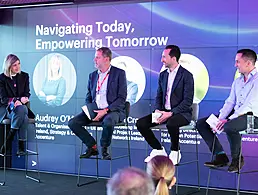Lero research fellow Dr Veeresh Thummadi discusses why workers will need to be open and willing to break habits in the face of AI and automation.
The advance of artificial intelligence (AI) and automation means that workers will need to prepare for the worst by developing long-term career plans and learning new skills and habits.
Workers in large organisations face significant challenges in keeping up with changing workplace environments. As we see a shift towards automation, workers need to be attentive to the type of skills and habits that they need to learn to survive in tough labour markets.
For example, automation of the supermarket checkout process from manual to self-checkout shifts the locus of work from purely physical systems to digital ecosystems, where workers are expected to learn a host of new skills such as troubleshooting, installation and maintenance.
While automation can shift the place of work and available jobs, organisations still need to outperform competitors, and this requires a significant amount of training and reskilling of workers.
Are these changes something new?
Over the centuries, workers have always been challenged in terms of the changing nature of work and work environments. For instance, the rise of computers in the late 20th century resulted in the death of jobs like typists and stenographers.
Workers such as professors, IT professionals and office assistants commenced typing and computing as a standard part of their work. This suggests that as technologies emerge, roles and habits of workers are reshaped.
The rise of emerging technologies like AI is shifting roles and cognitive processes, similar to the way computers have done in the past.
For example, a self-driving car would mimic the behaviours of drivers, automating the job of driving and decision-making. So, the driver needs to shift their attention from constant manoeuvring to tasks such as alertness, occasional manoeuvring and occasional decision-making. This means that significant learning has to happen from both parties – drivers and companies such as Tesla – to change the existing habits of driving or what it even means to drive.
So how do skills and habits affect work processes?
In a recent study, researchers from Case Western Reserve University in the US and Lero, the SFI Research Centre for Software at the University of Limerick, found that the effects of different design methods on work practices are similar, suggesting methods may matter less than expected.
This indicates that the habits of the workers are potential areas for improving the work process. As organisations embrace new technologies, new patterns get created, which would require a reshuffling of the existing repertoire of habits.
AI has the potential to alter the work processes and routines in organisations either by automation or by augmenting human intelligence. To survive in competitive labour markets, workers need to rethink how they carry out tasks.
Existing work habits may not be directly translatable. This means workers need to be more open and willing to break habits to meet the needs of the organisation. Some habits may be more beneficial than others, and workers need to be more introspective.
A thought experiment
As a thought experiment, a worker could compare how they work with their office neighbour. Do they approach their jobs in precisely the same way? Do equivalent tasks take equal amounts of time? What about the preparation and planning that happens before someone begins the work? Do both people do the same amount and do they both end up with the same results?
This type of thinking about our daily routine and habits can provide clues on ways to increase our productivity and efficiency.
Take, for example, two workers in a typical office setting. Worker A uses multiple monitors with a laptop, while worker B likes using just the laptop screen. Even though both workers engage in the same process, there may be subtle differences in terms of outcomes.
Worker A may be faster in transferring information from one file to another because they don’t have to toggle to copy and paste. Worker B might be more mobile – working remotely – as they are used to working with just their laptop.
Swings and roundabouts
On the face of it, it is swings and roundabouts. But say the job doesn’t require mobility. Then the advantage of worker B’s habits is negated. However, if the role involves data transfer from one file to another primarily, then worker A’s habits have a positive impact on productivity.
Furthermore, employees who may find the multi-screen method very helpful may not know that it is an option and therefore continue using the slower organisational process of using a single screen. Consequently, maximum productivity is not reached, and many employees may be left frustrated by the existing processes.
As organisations shift gears towards automation, workers need to prepare for the worst by developing long-term career plans through career counselling. In addition, learning new skills and habits can make workers more marketable and competitive.
Reskilling and training of the existing workforce in organisations will be required as technologies change, and new programming languages and application software are introduced. By being proactive and learning new skills and habits, workers can turn the game to their advantage.
Veeresh Thummadi is a research fellow at Lero, the SFI Research Centre for Software at the University of Limerick.




